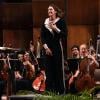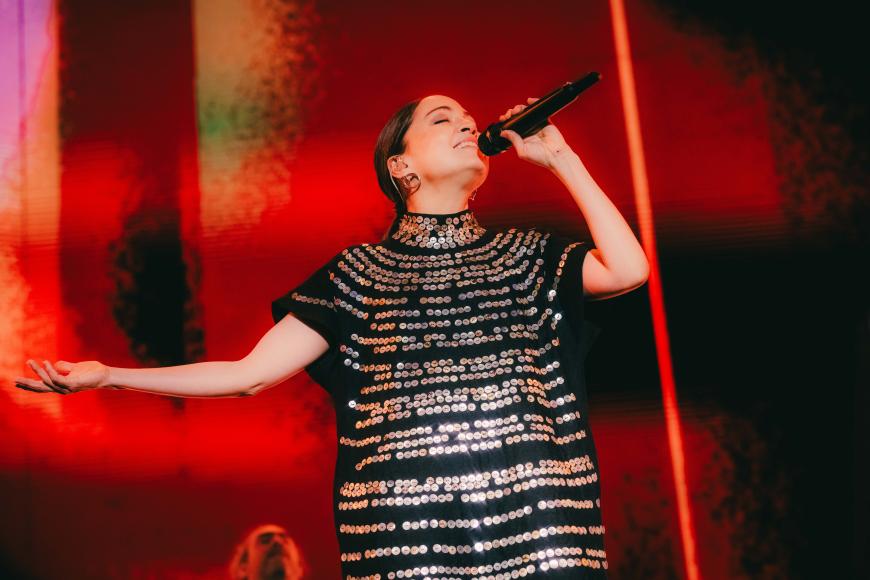
The winner of a record-setting 17 Latin Grammy Awards, more than any other Latina artist in history, as well as four regular Grammys, singer-songwriter Natalia Lafourcade returns to the Hollywood Bowl Sept. 6–7 in a program with Gustavo Dudamel and the Los Angeles Philharmonic. Lafourcade last played the Bowl in 2019, also with Dudamel, and in 2017 graced the stage of Walt Disney Concert Hall as part of the LA Phil’s CDMX festival (short for Ciudad de México, or Mexico City). In typical Lafourcade style, she wowed the audience.
The daughter of a Chilean father who plays harpsichord and lute and a Mexican mother who teaches music, Lafourcade, now 40, began writing songs at an early age and released her eponymous first solo album in 2002. In 2018, NPR described her as having “brought the past soaring into the 21st century and established herself as a proud guardian of Latin America’s musical legacy.”
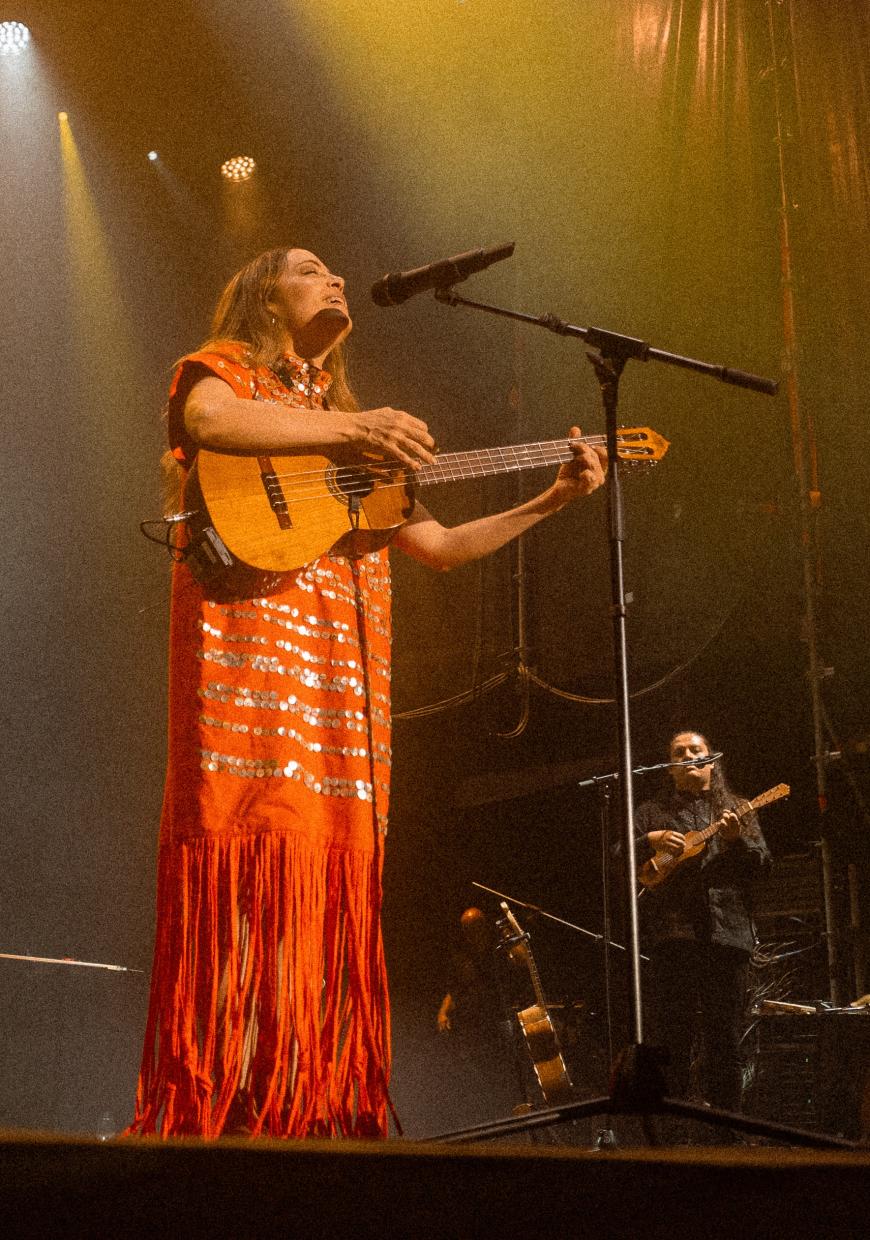
Much more than a singer-songwriter, Lafourcade, who lives in the countryside of Veracruz, has roots in jazz, classical, and bolero (a form of love song that originated in Cuba in the 19th century), as well as in the folk style of son jarocho from Veracruz. She has released 10 albums and had major hits with songs like “Nunca Es Suficiente” (It’s never enough), combining pop and rock with a love of Mexican roots music.
Her latest release, De Todas las Flores (Of all the flowers), was recorded during the pandemic and dropped in 2022, snagging three Latin Grammys last year. It was her first release of all new original material since her breakthrough 2015 album Hasta la Raíz (To the root).
As for her ties to symphonic orchestras, Lafourcade began performing with large ensembles in 2010, when she presented traditional Mexican music for the bicentennial celebration of Mexico’s independence with conductor Alondra de la Parra and the Philharmonic Orchestra of the Americas. And in October of this year, the beloved singer and composer performs at Carnegie Hall with Dudamel and the LA Phil.
Although well known for her songwriting, Lafourcade also interprets songs by iconic Latin American composers and has collaborated as an arranger, producer, and performer with international artists such as Juan Gabriel (an icon of Cuban son), Omara Portuondo (a member of Buena Vista Social Club who appeared on Lafourcade’s 2017 album Musas), and Venezuelan musician Devendra Banhart.
SF Classical Voice recently caught up with Lafourcade by Zoom, the conversation ranging from her upcoming Bowl gig and her composing process to racking up oodles of Latin Grammys. This interview has been edited for length and clarity.
What’s it been like working with Dudamel, and how would you describe your relationship?
I feel very honored and fortunate to be able to share music with him, [and] through time it becomes more familiar. The first time [in 2017] was [about] expectations — trying to see how everything was going to happen. I was very nervous about this encounter [because] I had never worked with him before. Now we know each other more, and we have experiences [together]. [It’s] this amazing thing whenever you get to see a friend that has a very rich universe [and] you can share your universe with that person.
For us every time, it’s the fun of the music and how easy it’s become. I remember the first time I was nervous before going onstage. I was expecting him to direct me. I said, “I need you to tell me what I’m going to do.” We didn’t have that much time [to rehearse], and then he said, “The show’s going to be great. You’re prepared for this. You just need to sing.” And I said, “I’m supposed to follow you.” He said, “You sing. We follow.”
For me, it made a switch in my mind about this situation [because now] it was about music. He gave me so much by just saying that. I was letting myself flow, getting into the music, the emotions — and he was following me. It was like a dance.
Dudamel opens the program with three contemporary pieces: John Adams’s Short Ride in a Fast Machine, Arturo Márquez’s Danzón No. 9, and Gabriela Ortiz’s Antrópolis. Then you’ll do a set with your band: bassist Carlos del Puerto, guitarist Andrew Synowiec, drummer Victor Indrizzo, percussionist Luisito Quintero, pianist Emiliano Dorantes, and jarana player Raymundo Pavón.
[Yes, and] the set will be 60 minutes. First, it’s the full orchestra with my band, and then I’m going to have the second part: 30 minutes of me, my guitar, and also my band. The set list has been a matter of building the narrative, [incorporating] a lot of influences that come from very traditional music from Mexico — the folk music that I love [and] those genres I’ve been able to explore: bolero, cumbia, norteño.
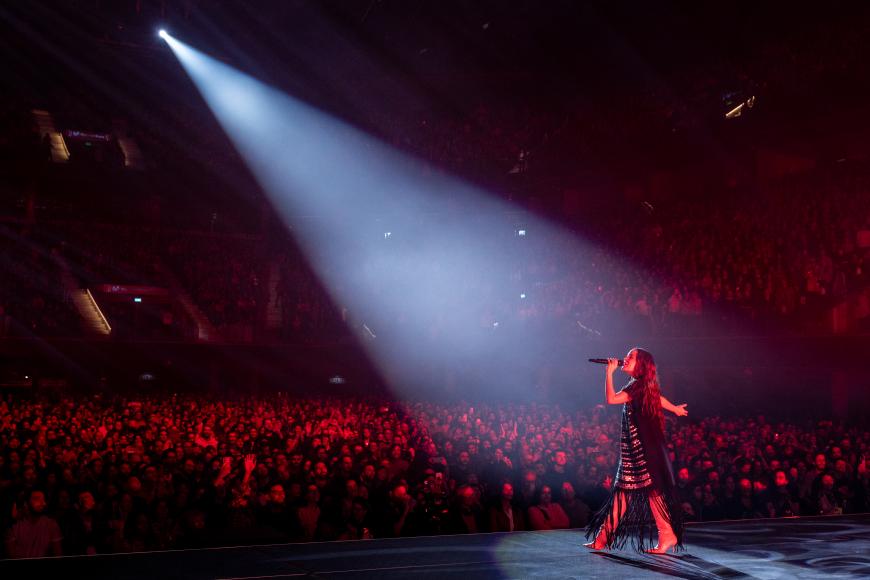
The different genres we have are going to be reflected in the way we arrange all the songs from the past, and we’ll also [perform] music from De Todas las Flores — [the songs] “Muerte” [Death] and “María la Curandera” [Maria the healer], which have influences of those artists, composers, and different genres in music and folk music that I’ve been exploring.
I understand you’ll also perform selections from Hasta la Raiz, Musas, and Musas, Vol. 2. I’m wondering what your composing process is — music first, lyrics first, a theme?
It depends on how I feel, my mood. Sometimes it comes all together. Sometimes I feel like the idea of a song could be happening in my mind, in a space in my brain. It’s developing itself over days. Then there’s a moment when I feel very inspired and I can get all that information [down on the page] in 20 or 30 minutes. It doesn’t always happen. Sometimes I grab a piece of paper [and] write honestly about what I want to say.
I come through days adjusting the words and melodies, the chords, and match that all together. I love collaborating, [and] I love writing on my own. The fact that somebody [else might have] ideas and all the brainstorming — when you try to put it together, it’s like a puzzle. Eventually you find the music and the songs. Sometimes I find that the songs are characters knocking on the door and [other] people can hear them. They have a very strong spirit and soul. You just need to listen so they can come through you. It’s not always the same way [with songwriting]; you need to be open to exploring different ways.
How would you describe your music and your career?
My music is a reflection of my inner world. If I had to put it in a very small phrase — it asks a lot of myself, my imagination, my mind. That’s why I use the metaphor of the inner garden of flowers. For me, getting into my own garden has been like a huge discovery, and I use that metaphor a lot. Nobody can come to this part of my garden. There are so many different places, [and] this is a place just for myself. It’s my persona.
I would like to say that my music has influences that come from Mexico, Latin America, and also the world. I see music like a master [medium]. It’s a really good vibe, and everything can happen. There’s no limit for genres. You can mix whatever you want. You can have so many different options and ways of doing it.
Music is actually very versatile, if you let it come through you. I see it like almost a medicine. For me, it heals me so much. It makes me so happy, so vulnerable, so sensitive. It’s very impressive to see how that happens [to others as well] when you are on the stage.
I think I’m very sensitive, and I try to collaborate with music, and what I do is the result of all those inspirations — [like] Earth. I want my music to sound like a genre of landscapes, a building of the music. Sometimes I say to my band, “Please play as if you were a river or sea or the wind.” Before, they would ask, “What are you saying?” Now they understand very well what I mean.
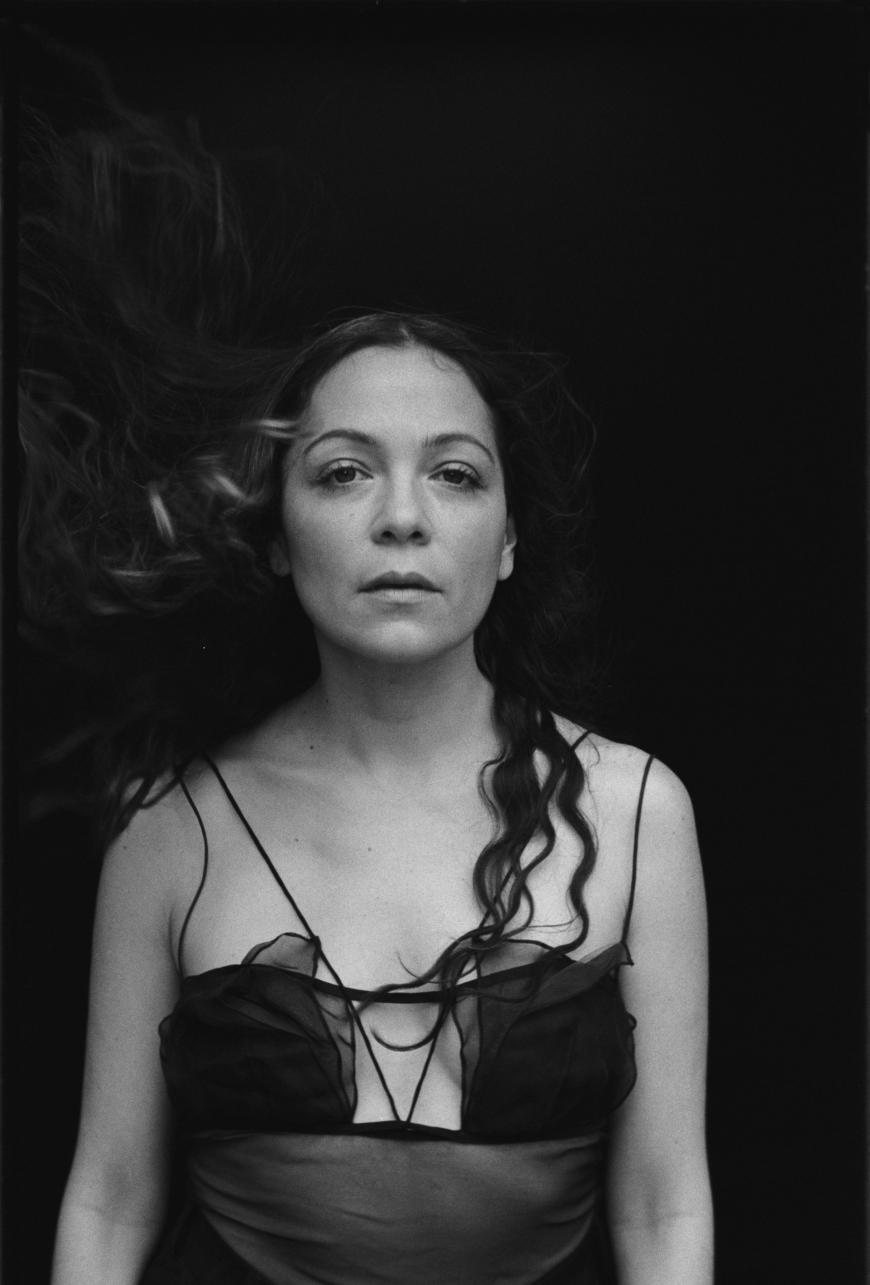
Who have been some of your musical inspirations?
I have a lot of inspirations. They could come from the very classical world — [Frédéric] Chopin, [Claude] Debussy, Mozart. I love Bach. I love jazz. When I was very young, I listened to Billie Holiday. I said, “Wow, she was blowing my mind.” I loved her immediately. Etta James, Ella Fitzgerald, the blues. When I was getting into [composer Agustín] Lara — he was like a teacher for me [when] I was trying to learn music on the guitar.
Toña la Negra — she was [a Mexican singer] like Etta James. Aretha [Franklin]. I was searching about these kinds of women in the world who were important in music. I was going to Central and South America, [listening to] music from Cuba, from Peru, from Venezuela, from Colombia — all the folk music and the traditional music from Argentina, the tango. Brazil is very important in my music, from the very first album to now. I was always feeling the influence of [Brazilian composers] Caetano Veloso, Antônio Carlos Jobim, Gilberto Gil. I love flamenco, music from Spain.
It’s very, very open for me. But I’ve found that it’s mostly music more related to something that comes in a very naked way — not so overproduced, especially [with music from] the last 10 years, even though I do a lot of overproducing myself. But I love those people who sustain a song just with their instrument or voice.
What’s it like to keep winning Grammys?
I feel very honored and grateful. [But] when I’m working on music, I don’t think about those kinds of things. Maybe that’s a secret or something that helps. I just try to do things that come from the heart, that are very honest and honor the music that I love — and also the music that comes to my persona.
It shows me the love from people and my colleagues [who are] listening to my projects and [are] voting for them. It’s a great celebration, [but] I don’t work for that kind of recognition, to put that pressure on my back. I think it’s very important for me to be able to connect to the real and pure spirit of the piece that I am making, knowing that very few people might listen — maybe one, [maybe] a lot — and that I [am] very, very focused on the main thing. Which is, I believe, the music — that piece of music that you’re on at the moment.
On a slightly different note, I read that you like to bring mezcal with you to the studio.
Yes, I like to bring mezcal to the studio. I love mezcal. I think it’s a very magic drink to have around. It really gets you! You don’t drink mezcal very fast, [which] is something I love. You go sip by sip, and it contains you, gives you a good mood.


